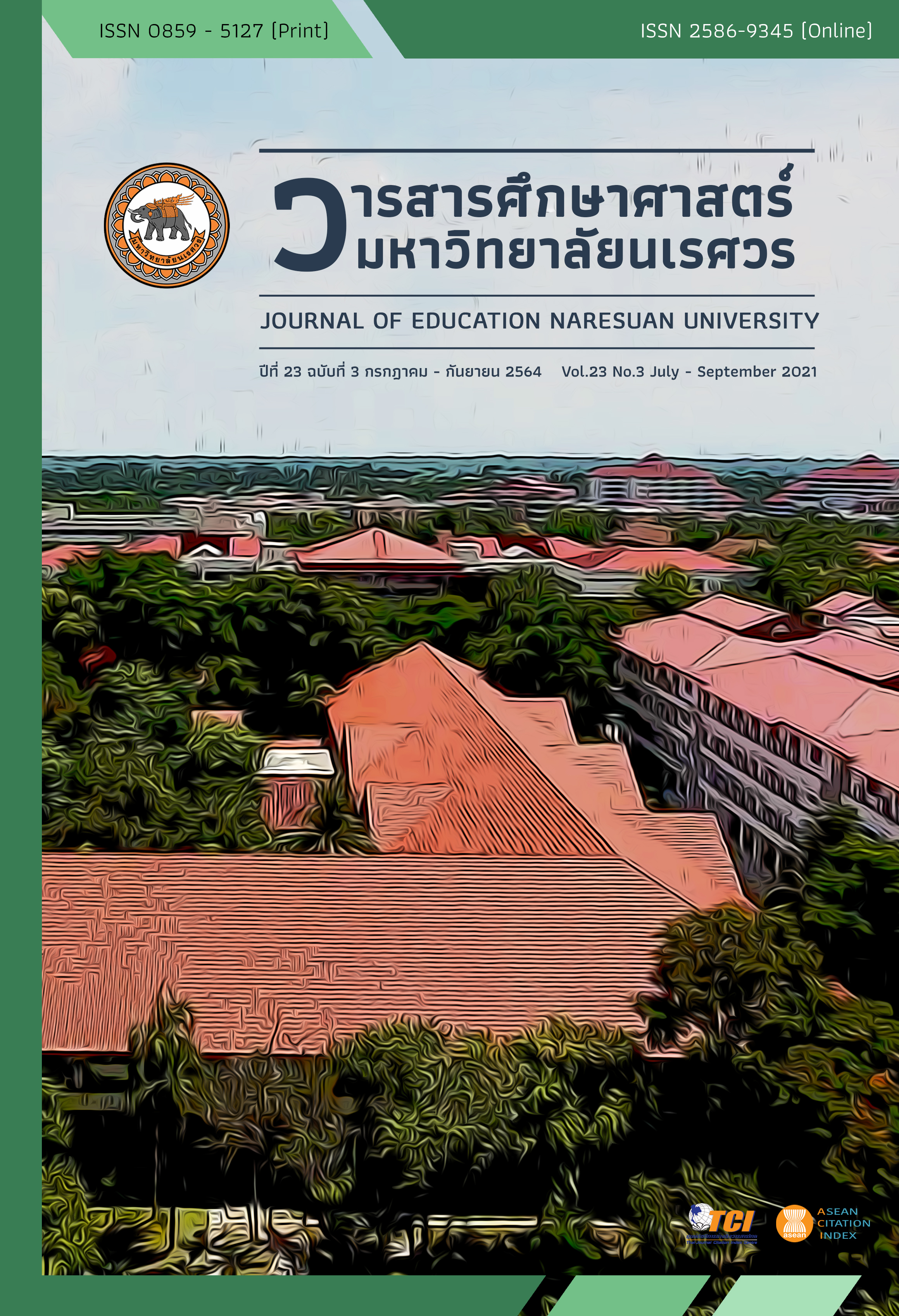การพัฒนาแนวทางการจัดการเรียนรู้โดยใช้บริบทเป็นฐานร่วมกับการโต้แย้ง เพื่อส่งเสริมการรู้สิ่งแวดล้อม เรื่อง ทรัพยากรธรรมชาติและสิ่งแวดล้อม สำหรับนักเรียนชั้นมัธยมศึกษาปีที่ 4 THE DEVELOPMENT OF CONTEXT-BASED-LEARNING WITH ARGUMENTATION FOR PROMOTING STUDENTS’ ENVIRONMENTAL LITERACY IN NATURAL RESOURCES AND ENVIRONMENT FOR TENTH GRADE STUDENTS
Main Article Content
บทคัดย่อ
การวิจัยครั้งนี้มีวัตถุประสงค์เพื่อศึกษาแนวทางจัดการเรียนรู้โดยใช้บริบทเป็นฐานร่วมกับการโต้แย้งเพื่อส่งเสริมการรู้สิ่งแวดล้อม เรื่อง ทรัพยากรธรรมชาติและสิ่งแวดล้อม และผลการส่งเสริมการรู้สิ่งแวดล้อมโดยใช้การจัดการเรียนรู้โดยบริบทเป็นฐานร่วมกับการโต้แย้ง การวิจัยครั้งนี้เป็นการวิจัยเชิงปฏิบัติการโดยเก็บข้อมูลจากนักเรียนชั้นมัธยมศึกษาปีที่ 4 จำนวน 30 คน เครื่องมือวิจัย ได้แก่ 1) แผนการจัดการเรียนรู้ เรื่อง ทรัพยากรธรรมชาติและสิ่งแวดล้อม 2) แบบสะท้อนผลการจัดการเรียนรู้ 3) แบบวัดการรู้สิ่งแวดล้อม และ 4) ใบงานสะท้อนผลงานการรู้สิ่งแวดล้อม ผลการวิจัย พบว่า แนวทางการจัดการเรียนรู้โดยใช้บริบทเป็นฐานร่วมกับการโต้แย้ง ควรเริ่มต้นจากการนำปัญหาสิ่งแวดล้อมในท้องถิ่นใกล้ตัวนักเรียนมาใช้เปิดประเด็นเพื่อกระตุ้นความสนใจของนักเรียน การทำความเข้าใจปัญหาเพื่อระบุผู้มีส่วนได้ส่วนเสียและการตั้งคำถามที่แสดงความสัมพันธ์ของเหตุและผลที่นำไปสู่การแก้ปัญหาการสืบเสาะและนำเสนอข้อมูลที่ตรงประเด็นจากแหล่งข้อมูลที่หลากหลายและน่าเชื่อถือ การโต้แย้งหาแนวทางการแก้ปัญหาที่ดีที่สุดจากดำเนินการและสร้างข้อตกลงร่วมกันของนักเรียน และการนำเสนอและสะท้อนผลการแก้ปัญหาที่มีประสิทธิภาพมากขึ้นในบทบาทของนักเรียนที่เป็นส่วนหนึ่งของชุมชนและสังคม นอกจากนี้ พบว่านักเรียนมีการรู้สิ่งแวดล้อมเพิ่มขึ้นจากระดับปานกลาง (56.67 คะแนน) เป็นระดับสูง (83.75 คะแนน)
Article Details
เจ้าของบทความมิได้คัดลอก หรือละเมิดลิขสิทธิ์ของผู้ใด หากเกิดการละเมิดลิขสิทธิ์ ไม่ว่าวิธีใด หรือการฟ้องร้องไม่ว่ากรณีใด ๆ ที่อาจเกิดขึ้นได้ กองบรรณาธิการวารสารศึกษาศาสตร์ ไม่มีส่วนเกี่ยวข้องทั้งสิ้น ให้เป็นสิทธิ์ของเจ้าของบทความที่จะดำเนินการ
เอกสารอ้างอิง
Ampai, S. (2015). The development of environmental literacy scale for lower secondary school students (Master thesis). Bangkok: Chulalongkorn University. [in Thai]
Arthman, J., & Monroe, M. (2004). The effect of environmental-based education on students’ critical thinking skills and disposition toward critical thinking. Environmental Education Research, 10(4), 507-522.
Bennett, J., & Lubben, F. (2006). Context-based chemistry: the salters’ approach. International Journal of Journal of Science Education, 28(9), 999-1015.
Chareonwongsak, K. (2002). Analytical thinking. Bangkok: Success Media. [in Thai]
De jong, O. (2006). Making chemistry meaningful: Conditions for successful context-based teaching. IV Jornadas Internacionales, 17(4e), 215-221. http://dx.doi.org/10.22201/fq.18708404e.2006.4e.66010
De Jong, O., & Taber, K. S. (2014). Handbook of research on science education, chapter: The many faces of high school chemistry. New York: Routledge.
Easton, P. (2014). Sustaining literacy in Africa: Developing a literate environment. Paris: the United Nations Educational, Scientific and Cultural.
Funk, C., & Kennedy, B. (2016). Everyday environmentalism. Pew Research Center. Retrieved March 30, 2018, from http://www.pewinternet.org/2016/10/04/everyday-environmentalism/
Haruehansawasin, S. (2019). Scaffolding in problem-based learning for vocational learner. Vocational Education Innovation and Research Journal, 3(1), 65-75. [in Thai]
Hollweg, K. S., Taylor, J. R., Bybee, R. W., Marcinkowski, T. J., McBeth, W. C., & Zoido, P. (2011). Developing a framework for assessing environmental literacy. Washington, DC: North American Association for Environmental Education.
Ilhami, A., Riandi, R., & Sriyati, S. (2019). Implementation of science learning with local wisdom approach toward environmental literacy. Journal of Physics Conference Series, 1157(2), 1-5.
Khemmani, T. (2012) Science of teaching: Effective learning management. Bangkok: Chulalongkorn University Press. [in Thai]
Khotrakul, S. (2016). Educational psychology. Bangkok: Chulalongkorn University Press. [in Thai]
Mahapol, N. (1990). International environmental problems. In Thai Encyclopedia for Youth by His Majesty the King, Volume 15 (12th ed.). Bangkok: Thai Encyclopedia Project for Youth. [in Thai]
Martin, A. (2018). Environment and technology risk the world should worry about in 2018. Zurich Insurance. Retrieved March 31, 2018, from https://www.zurich.com/en/knowledge/articles/2018/01/environment-and-technology-risks-the-world-should-worry-about-in-2018
NAAEE. (2011). Environmental literacy framework. Retrieved March 22, 2019, from https://naaee.org/our-work/programs/environmental-literacy-framework
Namdej, N. (2014). Self-directed learning. Dental Nurse Journal, 25(2), 27-38. [in Thai]
Office of Natural Resources and Environmental Policy and Planning. (2017). The environmental situation in the country. Journal of Environmental Quality Situation, 1(2). 1-7. [in Thai]
Phanyosri, P., & Chuchart, A. (2016). Effects of socio-scientific issues-based learning on environmental literacy of lower secondary school students. An Online Journal of Education, 11(2), 336-350. [in Thai]
Phua, M. P. E., & Tan, A. L. (2018). Promoting productive argumentation through students’ questions. Asia-Pacific Science Education, 4(4), 1-24.
Ritjaroon, P. (2014). Project assessment techniques. Bangkok: House of Kermyst. [in Thai]
Sirithon, N., & Jantarakantee, E. (2562). Implementing argument-driven inquiry approach for developing grade 10th students’ ability in making scientific explanation in the topic of force, mass, and law of motion. Silpakorn University Journal, 39(1), 130-141. [in Thai]
Sirited, P., & Thammaseeha, N. (2019). Self-efficacy theory and self-healthcare behavior of the elderly. Journal of The Royal Thai Army Nurses, 20(2), 58-65. [in Thai]
Taconis, R., Brok, P., & Pilot, A. (2016). Teachers creating context-based learning environments in science. Sense: Rotterdam, Netherland.
Thanapud, A., Pitiporntapin, S., & Jantrarotai, P. (2015). Development of grade 10th students’ argumentation skills in natural resources unit using socioscienctific issues - based teaching. KKU Research Journal (Graduate Studies) Humanities and Social Sciences, 3(2). 14-24. [in Thai]
Ultay, N., & Calik, M. (2012). A thematic review of studies into the effectiveness of context-based chemistry curricula. Journal science education technology, 2012(21), 686–701.
Walker, P., & Sampson, V. (2013). Learning to argue and arguing to learn: Argument-driven inquiry as a way to help undergraduate chemistry students learn how to construct arguments and engage in argumentation during a laboratory course. Journal of Research in Science Teaching, 50(5), 561-596.
World Economic Forum. (2018). The global competitiveness report 2018. Retrieved from https://www.weforum.org/reports/the-global-competitveness-report-2018
Yu, K., Fan, S., & Lin, K. (2015). Enhancing students’ problem-solving skills through context-based learning. International Journal of Science and Mathematics Education, 13(6), 1377-1401. DOI:10.1007/s10763-014-9567-4


